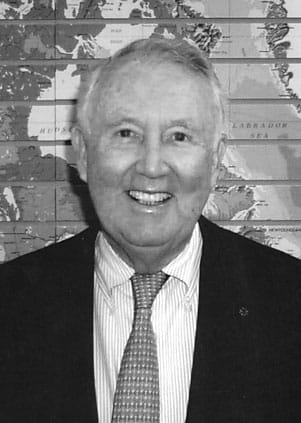Frank Rooney used to tell everyone who would listen that the way to do good business was hands-on and with as few executives as possible. In the 1980s, as its sales grew to $7 billion, Rooney’s Melville Corp. had but seven executives at its Harrison, NY, headquarters. “I’m allergic to memos,” he often said. He would regularly log 50,000 miles a year visiting the businesses he acquired and built in his 23 years as he created a retail conglomerate.
used to tell everyone who would listen that the way to do good business was hands-on and with as few executives as possible. In the 1980s, as its sales grew to $7 billion, Rooney’s Melville Corp. had but seven executives at its Harrison, NY, headquarters. “I’m allergic to memos,” he often said. He would regularly log 50,000 miles a year visiting the businesses he acquired and built in his 23 years as he created a retail conglomerate.
In 1964, when Rooney took over as president at Melville, it was a $180 million company primarily consisting of the discount shoe chain, Thom McAn, and some of its manufacturers. But Rooney foresaw the rise of specialty retailing as the first post-World War II suburbanites nestled quite comfortably in their communities. Melville bought or created such chains as Chess King, for boys and men’s clothing; Foxmoor, for young women’s apparel; Kay-Bee, for toys; Linens n’ Things, for sheets and home wares; Marshall’s, for off-price clothing, and CVS, for drugs and cosmetics.
While department stores may have anchored malls, Rooney saw Melville’s portfolio of specialty stores as a big draw. He would often have five or more Melville stores in a mall, giving him clout in rents and sales during the big mall boom of the 1960s, 1970s, and 1980s. Rooney’s theory was that specialty stores could control inventory better than department stores, since the latter had to have many categories, where his stores could concentrate on trends in just one. In many cases, especially shoes, Melville also owned the manufacturer, making it even easier to control the inventory.
When Rooney retired as CEO in 1987, he was by succeeded by CVS founder, Stanley Goldstein, W’55 (see p. 22). In 1991, Rooney emerged from retirement to return to the shoe business as chairman for H.H. Brown Shoe Co., to succeed Ray W. Heffernan, the late father of his wife Frances.


























